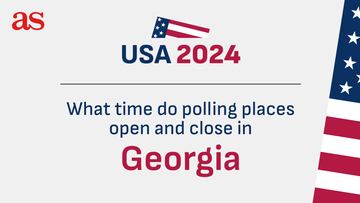What time do polling places close in Georgia? GA closing times in the US Election 2024
Everything Georgia voters need to know as they cast their ballot in the Presidential Election, with Kamala Harris going head to head with Donald Trump.


With the 2024 U.S. Presidential Election upon us, Georgia voters are getting ready to head to the polls on Tuesday, Nov. 5. This guide outlines polling hours, what you need to bring to vote, and other key information to help ensure a smooth experience on Election Day itself.
Follow US Election 2024 live updates: Trump vs Harris Presidential Race.
Polling hours in Georgia
On Election Day, polling places in Georgia open at 7 a.m. and close at 7 p.m. If you’re in line by 7 p.m., you’ll be allowed to cast your vote, even if it takes additional time to reach the voting booth.
The polling places will be open from 7 a.m. to 7 p.m., so it’s vital to check.
What to bring to vote in Georgia
In Georgia, you are required to show a valid photo ID to vote. Acceptable forms of ID include:
If you are voting in person in Georgia (including voting early), you must present one of the following forms of ID at the time you vote:
- Georgia driver's license
- Georgia voter ID or other ID card issued by the State of Georgia, any other state, or the US government
- Employee photo ID issued by the US government, Georgia government, or any county, municipality, board, authority, or other
- Georgia government entity
- Valid US passport
- Valid US military photo ID
- Student photo ID card issued by a Georgia public college, university, or technical school
- Valid tribal photo ID
Make sure your ID is current and not expired, as this is required for it to be accepted.
If you don’t have an acceptable ID, you can obtain a free photo voter ID card from your local county Board of Registrars office or a mobile ID unit. It’s a good idea to check that you have the necessary ID ahead of Election Day to avoid any last-minute issues at the polls.
Expected wait times and tips for a smooth voting experience
Line lengths can vary depending on the time of day and the location. Here’s a general guide:
Early Morning (7 a.m. - 9 a.m.): Many people vote early, so lines can be longer right when polling places open. If you can, avoid the 7 a.m. - 9 a.m. slot.
Midday (10 a.m. - 3 p.m.): Lines are often shorter, as this period sees fewer voters. If you have a flexible schedule, this is usually the best time to avoid long waits. That said, there is usually an increase between 11:30 a.m. and 1:30 p.m. so if you can avoid that two hour slot.
Late Afternoon and Evening (4 p.m. - 7 p.m.): Crowds tend to increase as people leave work, so lines can grow longer as polling places near closing. 5 p.m. to 7 p.m. is usually the busiest.
To make your voting experience easier:
- Bring water, snacks, and any needed medication if you anticipate waiting for a while.
- Check your polling location ahead of time; it may have changed from previous elections.
- Review your sample ballot before you go to save time when filling out your selections.
Other useful information for Georgia voters
The deadlines to register for absentee voting have now passed. Absentee ballots returned by mail must be received by noon on Election Day.
Provisional Ballots: If there’s an issue with your registration or ID, you may be allowed to cast a provisional ballot. These ballots are only counted once your eligibility is confirmed.
Related stories
Voter Hotline: Georgia’s Secretary of State office provides assistance via a voter hotline. Call (404) 651-8600 if you have any questions or concerns on Election Day.
Key takeaways for voting in Georgia on Election Day
To ensure you’re prepared for voting in the 2024 Presidential Election in Georgia:
- Polls are open from 7 a.m. to 7 p.m.
- Bring an acceptable photo ID to the polling station.
- Choose a voting time based on expected crowd levels.
- Plan for potential wait times and bring any essentials you may need.
- Check the status of your registration and polling location before you head out.
Complete your personal details to comment